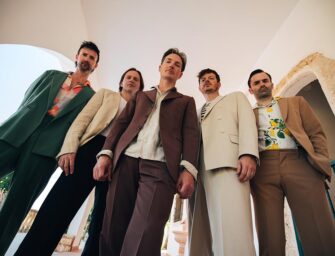
Lydia Brownfield: “When I get writer’s block, I find fast freestyle writing about the song subject is really helpful.” Photo credit: Joy Kollmer
By mining her own process and writing on new album ‘Dig’, the folk songwriter has unearthed a septet of tips
Like all of the best songwriters, Lydia Brownfield has experienced the highs and lows that life has to offer. It’s all there in her music: her early life in Columbus, Ohio, the blossoming of her career in Atlanta, performing in the coffee houses of Greenwich Village, not to mention two divorces. Those life lessons all shine through on new album Dig. A record that deftly tackles both the political and personal, all bound together with her edgy folk style, it’s a testament to her ability to act as both vessel and navigator.
Here, Lydia examines her own process and the creation of Dig in order to tease out seven tips that will help other songwriters best express themselves through music and lyrics…
Songs are puzzles or paintings that sometimes take me years to complete. Getting each word exactly right, each thought narrowed down to perfectly convey its intention, deleting more and more of the bullshit until the lyric is free from all things non-essential. Ah, the perfect lyric. I usually realize soon after a song is complete, that it’s not the perfect lyric after all. The pieces almost fit, and the picture is almost right. But I see the flaws.
1. Let the music play
When searching for the right lyrics, I always allow the music to influence the words. The entire end result should fit snug (like pieces in a puzzle) so that the lyrics and music live in perfect harmony with one another.
I spend a lot of my time considering the best way to describe my predicament. And by “my predicament” I mean the relationship between myself and the world. I’m awkward. I’m the fish out of water. The tree in the forest, a shadow at dawn, the invisible woman. Am I on the inside looking out, or the outside looking in? Do I enjoy writing songs, or would I rather do something else with my time? Have I just come so far that to do something else now would be foolish? Like getting out of one grocery line because it’s too long only to get in a shorter line with no checkout clerk. This, of course, isn’t a unique predicament, but part of what makes me happiest is crafting these considerations into song lyrics.
Sometimes I just let a song be finished, flaws and all. Occasionally I may find, ten years later, the missing piece of the puzzle. Then I’ll rewrite it, I’ll delete that song from everything, and replace it with the new version. Only to find it’s not exactly right either. And over and over again. Then I have multiple versions of a song – and none of them feel exactly right. It’s exhausting.

Lydia Brownfield: “I swing wildly between faith and doubt.” Photo credit: Joy Kollmer
2. Keep the leftovers
When I finish a song, there’s usually a lot of words or phrases that I really liked but didn’t exactly express what I needed in that particular song, so I keep a running document of all these in case they could be useful in future songs.
This new album has three songs that are rewrites. Broken was first written from the vantage point of a woman breaking off a relationship, and feeling remorse for leaving… then the more I listened the more I heard that she was actually in an abusive relationship – so the words changed to reflect that story, because that was the story the music told all along. Hurricane got a brand new chorus for this album. It first had a pre-chorus and chorus that took it to a near 50s doo-wop place – but that sounded disjointed from a song about the one that came in and wreaked havoc on someone’s life. Say You Understand was originally titled Nashville Love Song, then it was called Love, Love, Love, and has been re-recorded four times now. I’m still not sure it’s finished.
3. Freestyle it out
When I get writer’s block, I find fast freestyle writing about the song subject is really helpful. Spend about 30 minutes writing furiously without giving your brain the time to self-correct. Sing what you’ve written over the music you’ve been working on, and be sure to have your recording app running. Some of the most inspiring demos I’ve made have happened like this. Afterwards, go through and reevaluate.
For me, whatever music I find on the guitar when I pick it up is what inspires the words. Most times the idea for the song isn’t even known to me until the music is made. I love that about songwriting. I love that it can feel spontaneous and truly existential. As if I’ve birthed a song that the universe made.
4. Try alternate tunings
Sometimes I feel the guitar has absolutely nothing left for me to play. As if I’ve played every chord progression and every note known to mankind and there’s just nothing new. I find alternate tunings can be totally inspiring! I wrote Everything Out There in something close to open D. (Note: Be sure to write down your tuning or you’ll never be able to play that song again!)
A lot of my songs are conversations about whether I’m doing something worthwhile or wasting my time. When I dig deeper the question usually waiting at the bottom of the rabbit hole is, how do I define success? Against The Light is the story of a moth’s plight to make the light love her. The moth doesn’t know why she needs the light. She will just bang herself against it over and over, as if that light is going to save her, the moth. Which, ironically, will only bring death to the moth. The urgency in the music, which is exacerbated by the 5/4 time signature in the verses, gave way to the lyrics which for me fits pretty perfectly together. All the words may not be exactly right, but it’s close. It’s close enough to be finished, for now.

Lydia Brownfield: “Find out how you want the song structured first, and that may help with how to arrange your lyrics.” Photo credit: Joy Kollmer
5. Be open to influences, not distractions
When I’m working on a song, I really don’t want to listen to anything because I don’t want to be influenced or distracted. Sometimes I find it helpful to listen to instrumental music or vibey foreign language artists, such as Icelandic or Portuguese singers. Their voices and words are beautiful but since I don’t know what they’re saying, it’s less distracting and I’m more able to feel the vibe and use that to help me with my story.
As the canvas gets fuller and fuller and more saturated with color and hue upon more color, upon texture upon thickness upon…time, the future slips into the past and I look back and wonder if all I’ve done has been worth the effort. I mean, they’re just songs. Who has time for this childish collecting of words and music? “Get a job! Make yourself useful!” says The Committee living in my head. I swing wildly between faith and doubt. Between the gigs, after all the crafting, the deleting, the rewriting, the recording, the shameless promotion, the question of whether I’m good enough still looms. Leaping full-on without a net is the faith I long for, but doubt still holds its firm grip on me. How long can I keep leaping? Will I know when to stop? Should I stop? How old is too old… am I too old? Is it a life well lived if you continue to bang yourself against the light? Or is it sad and pathetic? The Committee definitely has opinions. The song, Things I’ve Done, explores these, and other questions.
6. Define the structure
If I get stuck on the story of the song, it’s helpful for me to think about the structure I’m working with on that particular song. For instance; the chorus is what the song is about in a tight little nutshell. Then the verses tell the story in more detail. And the bridge is why I need to tell you the story. Find out how you want the song structured first, and that may help with how to arrange your lyrics.
At the end of the day, I always return to the question: What is success? Your success can only be declared by you, that much I know. For me, expressing my experience with no reservations and no inhibitions is my road to success. I’m not sure reaching success is really what I’m after if it means “arriving” someplace. Maybe the process is the success.
7. Double up
Most of the time I end up writing two songs at once. As I am figuring out what a song is about, I start writing words or phrases that grow from the music I’m playing. Sometimes after many words and phrases are written I realize I’m talking about two or even three different things, so one set of lyrics gets pushed aside and becomes a different song. Even as I am working through the music, some chord progressions also get pushed aside. Many times that discarded music and those discarded words end up together as a whole new song.
We are all trees in a forest: When we fall, we do make a sound. Whether anyone’s there to hear it, or like it, well that has nothing to do with me.


































Related Articles